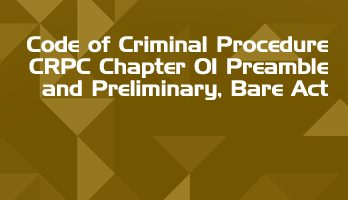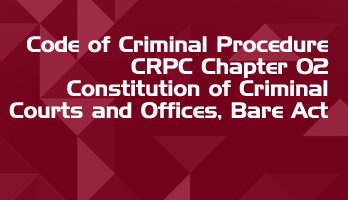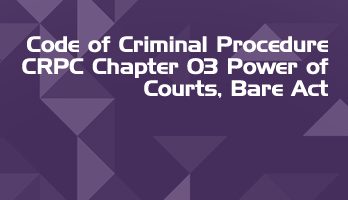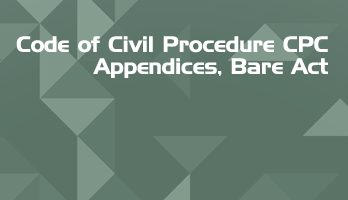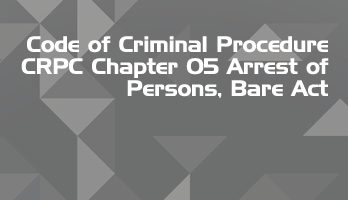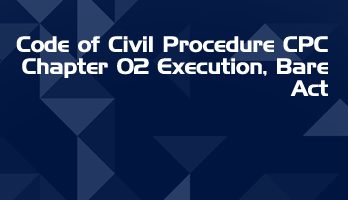Most acts are accompanied by 'subsidiary legislation' such as rules, regulations, notifications and orders; which address the actual implementation detail of the act.
Free Full Course Available on LawMint's YouTube Channel
How to Land Your Dream LLB Internship in a Top Law Firm
- Part 1 - Introduction
- Part 2 - Internship Planning
- Part 3 - Internship Research
- Part 4 - Building Your Profile
- Part 5 - The Email
- Part 6 - The Resume
- Part 7 - The Cover Letter
- Part 8 - The Interview
- Part 9 - Self Development
Practical and comprehensive course, with real examples and step-by-step analysis of the complete internship application process. Check out LawMint's YouTube channel now!
Code of Criminal Procedure, 1973
Chapter 37 – Miscellaneous
Section 474 – Trials before High Court
When an offence is tried by the High Court otherwise than under section 407, it shall, in the trial of the offence, observe the same procedure as a Court of Sessions would observe, if it were trying the case.
Section 475 – Delivery to commanding officers of persons liable to be tried by Court – martial
- The Central Government may make rules consistent with this Code and the Army Act, 1950 (46 of 1950), the Navy Act, 1957 (62 of 1957), and the Air Force Act, 1950 (45 of 1950), and any other law, relating to the Armed Forces of the Union, for the time being in force, as to cases in which persons subject to military, navel or air force law, or such other law, shall be tried by a Court to which this Code applies or by a Court – martial, and when any person is brought before a Magistrate and charged with an offence for which he is liable to be tried either by a Court to which this Code applies or by a Court – martial, such Magistrate shall have regard to such rules, and shall in proper cases deliver him, together with a statement of the offence of which he is accused, to the commanding officer of the unit to which he belongs, or to the commanding officer of the nearest military, naval or air – force station, as the case may be, for purpose of being tried by a Court – martial.
Explanation – In this section:
- “unit” includes a regiment, corps, ship, detachment, group, battalion or company.
- “Court – martial” includes any tribunal with the powers similar to those of a Court – martial constituted under the relevant law applicable to the Armed Forces of the Union.
- Every Magistrate shall, on receiving a written application for that purposes by the commanding officer of any unit or body of soldiers, sailors or airmen stationed or employed at any such place, use his utmost endeavours to apprehend and secure any person accused of such offence.
- A High Court may, if it thinks fit, direct that a prisoner detained in any jail situate within the State be brought before a Court – martial for trial or to be examined touching any matter pending before the Court – martial.
Section 476 – Forms
Subject to the power conferred by Article 227 of the Constitution, the forms set forth in the Second Schedule, with such variations as the circumstances of each case require, may be used for the respective purposes therein mentioned, and if used shall be sufficient.
Section 477 – Power of High Court to make rules
- Every High Court may, with the previous approval of the State Government, make rules –
- as to the persons who may be permitted to act as petition – writers in the Criminal Courts subordinate to it;
- regulating the issue of licences to such persons, the conduct of business by them, and the scale of fees to be charged by them.
- providing a penalty for a contravention of any of the rules so made and determining the authority by which such contravention may be investigated and the penalties imposed;
- any other matter which is required to be, may be, prescribed.
- All rules made under this section shall be published in the Official Gazette.
Section 478 – Power to alter functions allocated to Executive Magistrates in certain cases
If the Legislative Assembly of a State by a resolution so permits, the State Government may, after consultation with High Court, by notification, direct that references in sections 108, 109, 110, 145 and 147 to an Executive Magistrate shall be construed as references to a Judicial Magistrate of the first class.
Section 479 – Cases in which Judge or Magistrate is personally interested
No Judge or Magistrate shall, except with the permission of the Court to which an appeal lies from his Court, try or commit for trial any case to or in which he is a party, or personally interested, and no Judge or Magistrate shall hear an appeal from any judgement or order passed or made by himself. Explanation – A Judge or Magistrate shall not be deemed to be a party to, or personally interested in, any case by reason only that he is concerned therein in a public capacity, or by reason only that he has viewed the place in which an offence is alleged to have been committed or any other place in which any other transaction material to the case is alleged to have occurred and made an inquiry in connection with the case.
Section 480 – Practising pleader not to sit as Magistrate in certain Courts
No pleader who practises in the Court of any Magistrate shall sit as a Magistrate in that Court or in any Court within the local jurisdiction of that Court.
Section 481 – Public servant concerned in sale not to purchase or bid for property
A public servant having any duty to perform in connection with the sale of any property under this Code shall not purchase or bid for the properly.
Section 482 – Saving of inherent power of High Court
Nothing in this Code shall be deemed to limit or affect the inherent powers of the High Court to make such orders as may be necessary to give effect to any order this Code, or to prevent abuse of the process of any Court or otherwise to secure the ends of justice.
Section 483 – Duty of High Court to exercise continuous superintendence over Courts of Judicial Magistrates
Every High Court shall so exercise its superintendence over the Courts of Judicial Magistrates subordinate to it as to ensure that there is an expeditious and proper disposal of cases by such Magistrates.
Section 484 – Repeal and savings
- The Code of Criminal Procedure, 1898 (5 of 1898), is hereby repealed.
- Notwithstanding such repeal, –
- if, immediately before the date on which this Code conies into force, there is any appeal, application, trial inquiry or investigation pending, then, such appeal, application, trial, inquiry or investigation shall be disposed of, continued, held or made, as the case may be, in accordance with the provisions of the Code of Criminal Procedure, 1898 (5 of 1898), as in force immediately before such commencement (hereinafter referred to as the Old Code), as if this Code had not come into force: Provided that every inquiry under Chapter XVIII of the Old Code, which is pending at the commencement of this Code, shall be dealt with and disposed of in accordance with the provisions of this Code;
- all notifications published, proclamations issued, powers conferred, forms prescribed, local jurisdictions defined, sentences passed and orders, rules and appointments, not being appointments as Special Magistrates, made under the Old Code and which are in force immediately before the commencement of this Code, shall be deemed, respectively to have been published, issued, Conferred, prescribed defined, passed or made under the corresponding provisions of this Code.
- any sanction accorded or consent given under the Old Code in pursuance of which no proceeding was commenced under that Code, shall be deemed to have been accorded or given under the corresponding provisions of this Code and proceedings may be commenced under this Code in pursuance of such sanction or consent;
- the provisions of the Old Code shall continue to apply in relation to every prosecution against a Ruler within the meaning of Article 363 of the Constitution.
- Where the period prescribed for an application or other proceeding under the old Code had expired on or before the commencement of this Code, nothing in this Code shall be construed as enabling any such application to be made or proceeding to be commenced under this Code by reason only of the fact that a longer period therefore is prescribed by this Code or provisions are made in this Code for the extension of time.
Important Central Acts in Regional Languages
Legislative department website also features regional language versions of several important Central Acts.
Free Full Course Available on LawMint's YouTube Channel
How to Land Your Dream LLB Internship in a Top Law Firm
- Part 1 - Introduction
- Part 2 - Internship Planning
- Part 3 - Internship Research
- Part 4 - Building Your Profile
- Part 5 - The Email
- Part 6 - The Resume
- Part 7 - The Cover Letter
- Part 8 - The Interview
- Part 9 - Self Development
Practical and comprehensive course, with real examples and step-by-step analysis of the complete internship application process. Check out LawMint's YouTube channel now!







